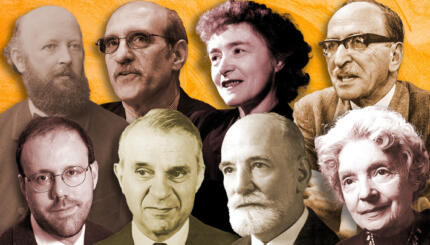What do we mean by Jewish humor? To begin, it is humor that is overtly Jewish in its concerns, characters, definitions, language, values or symbols. (A Jewish joke, goes one definition, is one that no goy can understand and every Jew says he has already heard.) But not all Jewish humor derives from Jewish sources, just as not all humor created by Jews is necessarily Jewish. In these matters it is best to examine not the singer but the song.
Jewish humor is too rich and too diverse to be adequately described by a single generalization. Jewish theologians used to say that it is easier to describe God in terms of what He is not; the same process may be useful in understanding Jewish humor. It is not, for example, escapist. It is not slapstick. It is not physical. It is generally not cruel and does not attack the weak or the infirm. At the same time, it is also not polite or gentle.
But individual humorists come to mind immediately to negate each of these tendencies: The Marx Brothers are slapstick performers; Jerry Lewis and Sid Caesar are physical; Don Rickles is cruel; Sam Levenson is polite and Danny Kaye is playful. So much for generalizations.
With your help, My Jewish Learning can provide endless opportunities for learning, connection and discovery.
Want to learn more about the origins and influence of Jewish humor? Sign up for this class!
What Jewish humor is may be even more difficult to determine, and we offer the following broad statements in full awareness of the possible futility of the exercise:
1. Jewish humor is usually substantive.
It is about something. It is especially fond of certain specific topics, such as food (noshing is sacred), family, business, anti-Semitism, wealth and its absence, health, and survival. Jewish humor is also fascinated by the intricacies of the mind and by logic, and the short if elliptical path separating the rational from the absurd.
As social or religious commentary, Jewish humor can be sarcastic, complaining, resigned, or descriptive. Sometimes the “point” of the humor is more powerful than the laugh it delivers, and for some of the jokes, the appropriate response is not laughter, but rather a bitter nod or a commiserating sigh of recognition. This didactic quality precludes laughing “for free,” as in slapstick humor, which derives its laughter from other people’s misfortunes.
2. Jewish humor tends to be anti-authoritarian.
It ridicules grandiosity and self-indulgence, exposes hypocrisy, and kicks pomposity in the pants. It is strongly democratic, stressing the dignity and worth of common folk.
3. Jewish humor frequently has a critical edge.
This edge creates discomfort in making its point. Often its thrust is political–aimed at leaders and other authorities who cannot be criticized more directly. This applies to prominent figures in the general society, as well as to those in the Jewish world, such as rabbis, cantors, sages, intellectuals, teachers, doctors, businessmen, philanthropists, and community functionaries. A special feature of Jewish humor is the interaction of prominent figures with simple folk and the disadvantaged, with the latter often emerging triumphant. In general, Jewish humor characteristically deals with the conflict between the people and the power structure, whether that be the individual Jew within his community, the Jew facing the Gentile world, or the Jewish community in relation to the rest of humanity.
4. Jewish humor mocks everyone — including God.
It frequently satirizes religious personalities and institutions, as well as rituals and dogma. At the same time, it affirms religious traditions and practices, seeking a new understanding of the differences between the holy and the mundane.
Reprinted with permission from The Big Book of Jewish Humor (HarperCollins Publishers)
Moshe
Pronounced: moe-SHEH, Origin: Hebrew, Moses, whom God chooses to lead the Jews out of Egypt.



